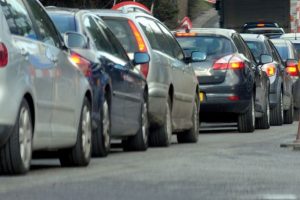DPF Short Journeys and Town Driving
Why a modern diesel car is the wrong choice for city driving.
You are probably aware by now, that a modern diesel engine car, fitted with a diesel  particulate filter would be the wrong choice if your vehicle requirement is largely to travel a few miles a day to the shops or doing the School run, and if you live in London or any other large town or city with stop – start driving and heavy congestion then it will probably be sooner, rather than later before you see the DPF warning light appear on the dash. A petrol car is a far better choice for this type of requirement.
particulate filter would be the wrong choice if your vehicle requirement is largely to travel a few miles a day to the shops or doing the School run, and if you live in London or any other large town or city with stop – start driving and heavy congestion then it will probably be sooner, rather than later before you see the DPF warning light appear on the dash. A petrol car is a far better choice for this type of requirement.
The reason for this, is that the Diesel Particulate Filter has to heat up to high temperatures, every few hundred miles in order to clean itself of the soot it has collected, in order to do this procedure (called re-generation) a number of criteria has to be met.
In order to carry out a Diesel Particulate Filter re-generation, the car has to be up to running temperature, e.g coolant, oil and exhaust gas temperature have to all be in normal running parameters, which can take 10 miles + to achieve with modern diesel cars.
In addition, the car has to be traveling at a constant speed, ideally for 15 – 20 minutes for the re-generation to be completed successfully, this is to ensure that there is a steady flow of cool air passing under the exhaust, and the DPF Filter itself.
As you can see, neither of these criteria are likely to be met if you only drive a few miles per day, or are unable to drive above 40 mph consistently on your journey. In fact diesel cars are not recommended for any motorists, who travels less than 12k – 15k miles per year, because the chances of expensive DPF problems are likely to follow.
In the event that the DPF is unable to re-generate, then the soot build up inside the filter will continue to grow as the system is unable to burn it off, and this can reach problem levels in as little as several hundred miles. At this point a DPF warning light will appear on the dash, indicating that you really need to consider taking the car on a long motorway journey, to enable the car to reach its ideal environment to carry out the desperately needed re-generation.
A blocked DPF is not only harmful to itself but can also result in a drop in fuel economy and even Turbo damage, due to the increased back pressure.
In some cases, the level of Soot inside the DPF will become so high, that simply driving the car on a long journey and completing the re-generation cycle will not solve the problem, and so a trip to a dealer or a cleaning specialist will be required, which can cost as much as £400. This is not an expense that you would want to be paying out every few hundred miles!.
If cleaning fails to correct the problem or the DPF has reached the end of its service life (generally between 90k and 120k miles) then it will need to be replaced, and the cost of this can range between £1000 and £2000.
So as you can see, prevention in the form of maintaining the DPF correctly and adjusting your driving style and use is better than the expense of paying to get the DPF cleaned professionally or replaced.
So what happens if I already have Diesel Car with a DPF and only do short journeys?
Well the obvious thing is to make a longer journey every few hundred miles in order to allow the DPF to regenerate. However, there is also an additive available, which is aimed at drivers in Towns and Cities who do short trips in traffic.
The additive is very effective as it was designed for buses and taxis which are always subject to traffic and slow speeds and using the additive in each fill of diesel reduces the amount of soot entering the DPF, which results in it running for much longer periods between re-generations. The additive also enables the DPF to regenerate at much lower temperatures, and so shortens the re-generation time.
The DPF additive is called CDTI Platinum Plus and unlike other basic DPF additives this is a patented and tested formula designed for low mileage drivers. The additive is expensive to buy, however the 1 litre bottle lasts a very long time at standard dosage, and is still around 25% of the cost of taking the car to a specialist for a single professional DPF clean.
Using quality premium diesel fuel, such as Shell V-Power or BP Ultimate is also recommend for cars which have DPF systems.
